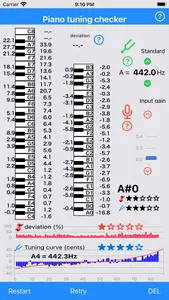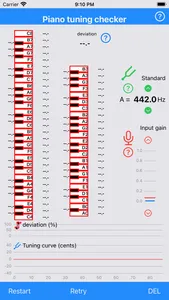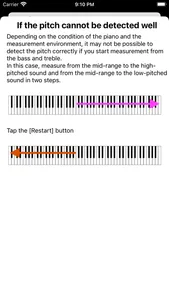~ Piano tuning check app ~
◆ Simple operation
-You can measure the tuning state of the whole piano in 120 seconds.
-You just play the piano sounds one by one while looking at the screen of your smartphone. You don't need to operate the app.
-You can also measure only where necessary. You can choose the start position and end position of measurement freely.
-The measured results are shown on the chart as the tuning curve for the theoretical Twelve-tone equal temperament.
◆ Professional accuracy
-This app uses the iPhone's microphone to scan the pitch 100 times per second.
-The scanned pitch data is filtered by mathematical analysis, including eliminating abnormal value and average value. The measurement results are displayed in 0.1 cent units. We have achieved more accurate and stable pitch analysis performance than the general music tuner.
◆ Basic functions
-The upper red bar chart shows the pitch deviation caused by pitch fluctuation and coordination deviation, and the lower blue bar chart shows the actual pitch deviation (0.1 point unit) related to the theoretical Twelve-tone equal temperament pitch.
The reference pitch can be set in 0.5Hz increments in the range of A = 430 to 450Hz.
◆ How to think about the Railsback-curve
According to the physical characteristics of the piano, the pitch of the high note is slightly higher, and the pitch of the low note is slightly lower, which is generally inconsistent with the theoretical Twelve-tone equal temperament. Drawing a graph of the degree of inconsistency is called a Railsback-curve.
Therefore, the pitches of the low and high frequencies after tuning generally do not match the theoretical Twelve-tone equal temperament.
In addition, the degree of this Railsback-curve differs depending on the basic specifications such as the length of each piano's music wire and the diameter of them, and there are also parts that differ depending on the policy of each tuner, so there is no "absolute" or "correct answer" in the tuning of the piano. ..
Please use this app as a tool to check daily changes in piano conditions.
* Please refer to the tuning graph in the sample screenshot as an example of proper stretch tuning.
◆ Caution
-according to the condition of the piano and the measurement environment, if the measurement starts from the bass and treble, the pitch may not be detected correctly.
In this case, the measurement starts in two steps, from the middle to the high end, and from the middle to the low end.
-Due to the short attenuation time of the treble part, it may not be possible to complete the measurement by one keystroke. In this case, press the key several times until the measurement is completed.
It has been proven to work on iPhone 7 or later.
◆ Simple operation
-You can measure the tuning state of the whole piano in 120 seconds.
-You just play the piano sounds one by one while looking at the screen of your smartphone. You don't need to operate the app.
-You can also measure only where necessary. You can choose the start position and end position of measurement freely.
-The measured results are shown on the chart as the tuning curve for the theoretical Twelve-tone equal temperament.
◆ Professional accuracy
-This app uses the iPhone's microphone to scan the pitch 100 times per second.
-The scanned pitch data is filtered by mathematical analysis, including eliminating abnormal value and average value. The measurement results are displayed in 0.1 cent units. We have achieved more accurate and stable pitch analysis performance than the general music tuner.
◆ Basic functions
-The upper red bar chart shows the pitch deviation caused by pitch fluctuation and coordination deviation, and the lower blue bar chart shows the actual pitch deviation (0.1 point unit) related to the theoretical Twelve-tone equal temperament pitch.
The reference pitch can be set in 0.5Hz increments in the range of A = 430 to 450Hz.
◆ How to think about the Railsback-curve
According to the physical characteristics of the piano, the pitch of the high note is slightly higher, and the pitch of the low note is slightly lower, which is generally inconsistent with the theoretical Twelve-tone equal temperament. Drawing a graph of the degree of inconsistency is called a Railsback-curve.
Therefore, the pitches of the low and high frequencies after tuning generally do not match the theoretical Twelve-tone equal temperament.
In addition, the degree of this Railsback-curve differs depending on the basic specifications such as the length of each piano's music wire and the diameter of them, and there are also parts that differ depending on the policy of each tuner, so there is no "absolute" or "correct answer" in the tuning of the piano. ..
Please use this app as a tool to check daily changes in piano conditions.
* Please refer to the tuning graph in the sample screenshot as an example of proper stretch tuning.
◆ Caution
-according to the condition of the piano and the measurement environment, if the measurement starts from the bass and treble, the pitch may not be detected correctly.
In this case, the measurement starts in two steps, from the middle to the high end, and from the middle to the low end.
-Due to the short attenuation time of the treble part, it may not be possible to complete the measurement by one keystroke. In this case, press the key several times until the measurement is completed.
It has been proven to work on iPhone 7 or later.
Show More


